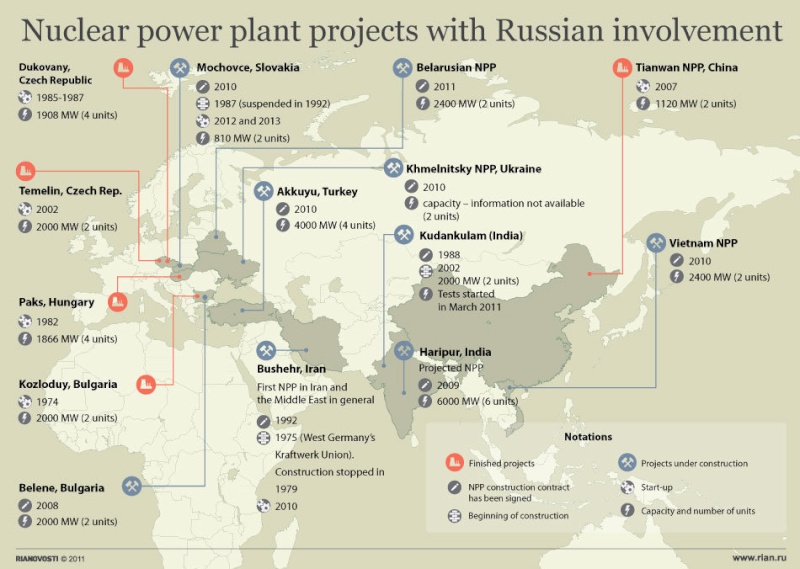Deputy Director General of ROSATOM K. Komarov held a presentation at the 4th BRICS Business Forum
On March 26, Mr. Kirill Komarov, Deputy Director General of ROSATOM for Development and International Business, held a presentation “Nuclear as a factor of social and economical development” at the 4th BRICS Business Forum, which took place parallel to the 5th BRICS Summit in Durban, South Africa.
According to Komarov, Fukushima accident, despite the expectations, had not dramatically affected the positive trend for global development of nuclear power, and the consensus forecast showed that by 2030 installed NPP capacity would reach roughly 590 GW, which represented a decrease of 11% in comparison to 'pre-Fukushima' forecasts. Furthermore, most countries are continuing to keep their political will towards developing national nuclear power programs. He cited Russia as an example, where the national construction program had been fully preserved, and ROSATOM even managed to double its portfolio of nuclear plant projects abroad. Today ROSATOM’s portfolio of foreign orders exceeds 70 billion USD, and the company is implementing projects to construct 28 NPP units, including 9 units in Russia and 19 abroad.
He pointed out, that nuclear energy is not only an effective and clean source of energy itself, but it also stimulates the national industrial development, particularly giving a powerful impulse for the development of construction and engineering industries, as well as encourages the creation of many new jobs. Komarov also added that nuclear energy acts as a driver for the development of a country’s scientific and technological capacities, education, and many other fields.
Talking about BRICS and African countries, Komarov noted, that due to a number of crisis events in the Western world economy, as well as certain slowdowns in Asia’s economy growth, only BRICS and Africa could be considered as the points with significant economy growth potential.
“But Africa, being a continent suffering from electricity deficit, won’t be able to bring all its potential into life without meeting energy needs for its growing economy. It is vital for African countries to create viable energy mix, which will guarantee their own energy security and drive the industrial development. That is the reason why more and more African countries are currently studying the opportunities for nuclear power development, and their intentions must be supported by the global community”, Komarov said.
He also emphasized that almost all of African countries as well as many other nations are newcomers in nuclear power, and in this regard countries with developed nuclear technologies should transfer the required technologies and knowledge, and solutions to construct new NPPs must be offered on an integrated basis, with unconditional priority being given to safety. “We are certain that nowadays a responsible vendor of nuclear technology shall be able to provide an integrated solution for emerging countries, and such an offer, apart from generation 3+ NPP construction itself, can and shall include the elements like assistance in development of national legislative and regulatory basis, personnel education and training, nuclear fuel cycle and radwaste management solutions, attraction of local industry capabilities, as well as financing support options”, Komarov stated. According to his words, such an approach would allow a newcomer country to fully meet its demands related to the development of nuclear power in full compliance with international requirements.
The speaker also stressed, that ROSATOM is a responsible vendor, which is actively cooperating with African countries in nuclear energy domain.
“We already have our own history of successful cooperation with Africa in this sphere. Last year, we’ve signed an intergovernmental agreement with Nigeria on cooperation in NPP construction. We have been working in Namibia and Tanzania in terms of uranium exploration and mining. With the Republic of South Africa our cooperation is the most lasting – starting from enriched uranium supplies for Koeberg NPP – up to a number of other cooperation spheres which we have on the agenda today”, Komarov told.
He added that ROSATOM’s activities in Africa are based on a strong principle – the projects must not only be mutually beneficial for the both sides, but also shall contribute to the development of local socio-economic sectors, ensuring creation of jobs, infrastructure development, and investments attraction. As an example he cited Mkuju River uranium mining project in Tanzania. ROSATOM entered the project in 2011 and since then the company has been contributing significantly to the local infrastructure development planning to create around 5000 jobs.
In the concluding part of his report, Komarov stressed the importance of BRICS as the world leader in the nuclear new-build. According to the report, in BRICS countries 74 power units are currently being operated, 45 are being under construction, and 130 units are planned for construction.
“We believe that BRICS may and should indeed play a leading role in promoting nuclear power technologies to African countries. From our side, ROSATOM is ready and willing to take an active part in this important process”, summarized Komarov.





